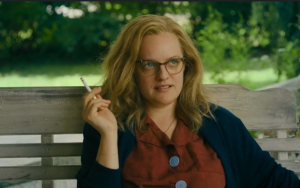SHIRLEY: 3 ½ STARS. “Moss is fascinating as the title character.”
 When reclusive author Shirley Jackson died in 1965 she left behind a body of work, including “The Haunting of Hill House,” a supernatural horror novel sometimes called one of the best ghost stories ever written. An influence on two generations of speculative fiction writers like Neil Gaiman, Stephen King, Sarah Waters and Richard Matheson, she is brought to vivid life in a new fictionalized drama, now on VOD, starring Elisabeth Moss.
When reclusive author Shirley Jackson died in 1965 she left behind a body of work, including “The Haunting of Hill House,” a supernatural horror novel sometimes called one of the best ghost stories ever written. An influence on two generations of speculative fiction writers like Neil Gaiman, Stephen King, Sarah Waters and Richard Matheson, she is brought to vivid life in a new fictionalized drama, now on VOD, starring Elisabeth Moss.
Set just after the publication of “The Lottery,” a controversial short story about the ritual sacrifice of a town citizen to ensure good crops, published in a 1948 issue of The New Yorker, the film sees Shirley (Moss) paralyzed by the expectations that hang heavy over “Hangsaman,” a novel she is struggling to complete. Prickly and quick with a line, she is less than pleased when Stanley (Michael Stuhlbarg), her college professor husband, arranges for his new assistant Fred Nemser (Logan Lerman) and his pregnant wife Rose (Odessa Young) to live in their house while the young couple searches for a place of their own.
As the days and weeks stretch into months the relationship between the two couples becomes a blend of art and reality, a claustrophobic rabbit hole where Rose becomes the model for Shirley’s new main character, a college student who went walking on Vermont’s Long Trail hiking route and never returned.
“Shirley” uses elements of Jackson’s life but places them in context of one of her novels. The result is a psychological drama; a haunting look at a person driven to agoraphobia by the weight of her success and a domineering, philandering husband.
Moss is fascinating as the title character. Her take on Shirley is that of a woman who has lived under years of oppression by her bullying husband, a man whose misogyny has left her embittered, desperate and anxious. “To our suffering,” Stanley says as a toast to his wife. “There’s not enough Scotch in the world for that,” Shirley snorts, in a line that could have been borrowed from “Who’s Afraid of Virginia Woolf?” She’s vulnerable and filled with rage, compassionate and spiteful, often in the same scene.
Shirley and Stanley, as compelling as they are as characters, do not comprise the film’s defining relationship. Director Josephine Decker feeds on the psychological aspects of Jackson’s work to tease out a story of Shirley and Rose, two women drawn together by frustration, talent and obsession over the missing woman at the heart of the new novel. “Let’s pray for a boy,” Shirley says to the pregnant Rose, “The world is too cruel for girls.” Their time on screen together is complicated, occasionally unsettling as reality and imagination meld. It’s fascinating work in a film that is a slow burn.
“Shirley” takes its time to get where it is going, building an atmosphere of oppression slowly and carefully. Decker’s distorted dream-like visual approach is often beautiful, as though we’re watching the film through a psychological prism. It creates atmosphere but doesn’t provide the thrills that Jackson herself might have been able to infuse into the telling of this tale.
